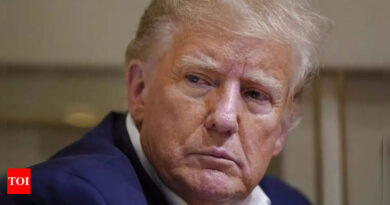Talks possible if Imran Khan apologised to nation for May 9 carnage: Pakistan minister Ishaq Dar – Times of India
ISLAMABAD: Pakistan finance minister Ishaq Dar has hinted that negotiations with former prime minister Imran Khan to end the political crisis were possible if he took ‘corrective measures’ and apologised to the nation for the May 9 violence in which sensitive military installations were attacked.
Dar made this assertion during a Geo News programme on Sunday, the day when Pakistan’s ruling coalition rejected Khan’s offer for dialogue, saying talks were held with politicians, not terrorists.
Khan, the chairman of the Pakistan Tehreek-e-Insaf (PTI) party constituted a seven-member team to hold talks with the government – for developing a consensus on a date for general elections – amid a massive crackdown on his party for the May 9 violence following his arrest.
The crackdown launched after May 9 violent protests have thrown PTI into a deep existential crisis with dozens of key party leaders quitting the party daily.
The prominent leaders who have quit the party include secretary general Asad Umar, senior leader Fawad Chaudhry and former minister Shireen Mazari.
“If he (Khan) takes corrective measures and apologises to the nation for the May 9 carnage, negotiations could be held,” Dar said.
Dar noted that before that fateful day (May 9), the government negotiated with PTI with “sincere intentions” and the two sides agreed on all matters except the date of the election.
The minister said peaceful protest was everyone’s right, but attacks on armed forces’ installations should not be condoned.
On May 9, violent protests erupted after paramilitary Rangers arrested 70-year-old Khan from the Islamabad high court premises in connection with a corruption case.
His party workers vandalised a dozen military installations, including the Lahore Corps Commander House, the Mianwali airbase and the ISI building in Faisalabad in response to Khan’s arrest.
The mob also stormed the Army headquarters (GHQ) in Rawalpindi for the first time.
Thousands of Khan’s supporters were arrested following the violence that the powerful Army described as a “dark day” in the history of the country.
The ambiguities of the federal government’s policy came into sharp focus, with railways minister Khawaja Saad Rafique asserting that there was no way talks could be held with Khan under the current situation.
“There used to be an environment and agenda for holding parleys on any issue. But the existing atmosphere is not suitable for talks,” the Dawn newspaper quoted him as saying.
Earlier this month, the National Assembly, the lower house of Pakistan’s Parliament, passed a resolution vowing to try May 9 rioters under the existing laws including the stringent Army Act and the Official Secrets Act.
Khan, a cricketer-turned-politician, was ousted from power in April last year after losing a no-confidence vote in his leadership, which he alleged was part of a US-led conspiracy targeting him because of his independent foreign policy decisions on Russia, China and Afghanistan.
Dar made this assertion during a Geo News programme on Sunday, the day when Pakistan’s ruling coalition rejected Khan’s offer for dialogue, saying talks were held with politicians, not terrorists.
Khan, the chairman of the Pakistan Tehreek-e-Insaf (PTI) party constituted a seven-member team to hold talks with the government – for developing a consensus on a date for general elections – amid a massive crackdown on his party for the May 9 violence following his arrest.
The crackdown launched after May 9 violent protests have thrown PTI into a deep existential crisis with dozens of key party leaders quitting the party daily.
The prominent leaders who have quit the party include secretary general Asad Umar, senior leader Fawad Chaudhry and former minister Shireen Mazari.
“If he (Khan) takes corrective measures and apologises to the nation for the May 9 carnage, negotiations could be held,” Dar said.
Dar noted that before that fateful day (May 9), the government negotiated with PTI with “sincere intentions” and the two sides agreed on all matters except the date of the election.
The minister said peaceful protest was everyone’s right, but attacks on armed forces’ installations should not be condoned.
On May 9, violent protests erupted after paramilitary Rangers arrested 70-year-old Khan from the Islamabad high court premises in connection with a corruption case.
His party workers vandalised a dozen military installations, including the Lahore Corps Commander House, the Mianwali airbase and the ISI building in Faisalabad in response to Khan’s arrest.
The mob also stormed the Army headquarters (GHQ) in Rawalpindi for the first time.
Thousands of Khan’s supporters were arrested following the violence that the powerful Army described as a “dark day” in the history of the country.
The ambiguities of the federal government’s policy came into sharp focus, with railways minister Khawaja Saad Rafique asserting that there was no way talks could be held with Khan under the current situation.
“There used to be an environment and agenda for holding parleys on any issue. But the existing atmosphere is not suitable for talks,” the Dawn newspaper quoted him as saying.
Earlier this month, the National Assembly, the lower house of Pakistan’s Parliament, passed a resolution vowing to try May 9 rioters under the existing laws including the stringent Army Act and the Official Secrets Act.
Khan, a cricketer-turned-politician, was ousted from power in April last year after losing a no-confidence vote in his leadership, which he alleged was part of a US-led conspiracy targeting him because of his independent foreign policy decisions on Russia, China and Afghanistan.




